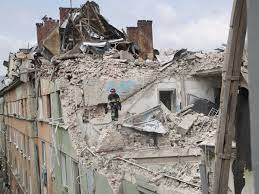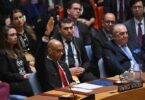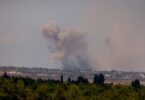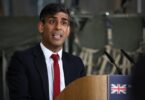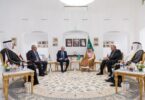Simon Tisdall
The pressing question of Ukraine’s membership is expected to dominate this week’s pivotal summit of 31 Nato states in Vilnius, Lithuania’s capital. Volodymyr Zelenskiy knows a gold-embossed official invite is unlikely to arrive while his country is still at war with Russia. But Ukraine’s leader is urging US president Joe Biden and alliance leaders to take immediate “concrete steps”, including security guarantees, a roadmap and timeline. Zelenskiy argues that would boost morale and send an implacable message to Vladimir Putin.
Zelenskiy is right. Like Finland, Ukraine’s accession should be fast-tracked. Yet important though this issue is, Nato faces a far bigger question this week: whether it is doing enough to ensure Kyiv wins the war – or at least, doesn’t lose. There’s a risk, if the current counteroffensive produces no breakthrough, weapons supplies run short, a new winter energy crisis strikes and western public support drops further, that Zelenskiy will be forced into negotiations – even into trading territory for peace. Secret, informal US-Russia talks are already under way. If Ukraine were already a Nato member, as promised 15 years ago, all this would not be happening.
Yet even now, Biden is refusing to go beyond beefed-up, long-term “security commitments”. Rishi Sunak says vaguely that Ukraine’s “rightful place” is in Nato. France’s president, Emmanuel Macron, is trying to have it both ways, as usual. Germany’s reliably insipid chancellor, Olaf Scholz, won’t discuss Kyiv’s membership until the war is over. They claim to be acting responsibly. But this too-familiar milksoppery, which unnecessarily and unwisely restricts Nato’s actions, is actually rooted in American and west European fears that Putin, provoked, might attack the west.
This is such facile thinking. Even when sober and with the wind behind it, Russia’s blundering army could not beat Ukraine’s 2nd XI. For all his threats, Putin fears Russia-Nato conflict, too. For him, it would be political and military suicide. The view from Nato’s east is thankfully more robust. “I hear a lot [of countries] saying that we shouldn’t do this or that because it provokes Putin or Russia and especially to use nuclear weapons,” Kaja Kallas, Estonia’s prime minister, said last week. “Those threats are to intimidate us. The definition of terrorism is to make us afraid so we refrain from the decisions we would otherwise make. And this is what they [Russia] are trying to do.”
East European Nato members, clubbed together as the newly-formed “Bucharest Nine”, issued a stirring call to arms last month, insisting that beating back Russian aggression was “the only way to restore peace and the rules-based order in Europe”. The nine – Bulgaria, Czech Republic, Estonia, Hungary, Latvia, Lithuania, Poland, Romania and Slovakia – all joined Nato after the 1991 Soviet collapse. They urged a “new political track that will lead to Ukraine’s membership… once conditions allow”. “We should not hesitate to take bolder decisions because otherwise the Putin regime will decide that the western allies are too weak (and when) pushed to the corner, they will surrender,” Lithuania’s president and summit host, Gitanas Nauseda, said.
The main objection to this argument was summarised by the former US Nato ambassador Ivo Daalder. “The problem confronting Nato countries is that as long as the conflict continues, bringing Ukraine into the alliance is tantamount to joining the war,” he warned. But there are precedents. West Germany gained Nato protection in 1955 even though, like Ukraine, it was in dispute over occupied sovereign territory – held by East Germany, a Soviet puppet. In similar fashion, Nato’s defensive umbrella could reasonably be extended to cover the roughly 85% of Ukrainian territory Kyiv currently controls.
That would provide enhanced air, missile and drone defence without “joining the war”. It would also allow a Nato military response if Russian forces, based in occupied territory or Black Sea waters, chose to launch additional, criminal attacks on civilians, like that which killed seven people in Lviv on Thursday. Anders Rasmussen, the former Nato secretary-general, recently raised the prospect of Poland and the Baltic states sending ground troops to help fight Russian forces on Ukrainian soil – if Nato as a whole failed to take a bolder line.
“I think the Poles would seriously consider going in and assemble a coalition of the willing if Ukraine doesn’t get anything in Vilnius,” Rasmussen said. “The Poles feel that for too long western Europe did not listen to their warnings against the true Russian mentality.” That latter view is strongly endorsed by A Wess Mitchell, a former US assistant secretary of state, who maintains that some west European governments, prey to “old taboos against antagonising Russia”, still don’t really get it.
Although arms are flowing to Kyiv, promises to boost eastern flank defences “remain largely unfulfilled”, Mitchell wrote. Since the start of the war, for example, France’s troop presence in Nato’s east has risen “from 300 to 969… and Italy’s from 350 to 385”. In contrast, “Nato’s eastern members have undertaken historic build-ups that will see Poland soon possess more tanks than all of western Europe combined”. Meanwhile, the US troop presence has risen from 5,000 to about 24,000.
Avoiding splits over Ukraine’s (and Sweden’s) membership is important. Infinitely more important is that all Nato countries fully grasp the wider implications of a Ukrainian failure to repel Russian aggression. If that happened, eastern and central Europe, the Nordic region and the Balkans would be destabilised. Nato would be forced on to a permanent war footing. International law would be shredded. A precedent would be set for China over Taiwan.
Ukraine would effectively be partitioned. And a gloating Putin and his gang, escaping justice, would be free to do it all again, there or somewhere else. So no more conditions, cavils and clever caveats, please. Nato must unleash its considerable power to ensure Ukrainian victory.
The Guardian

